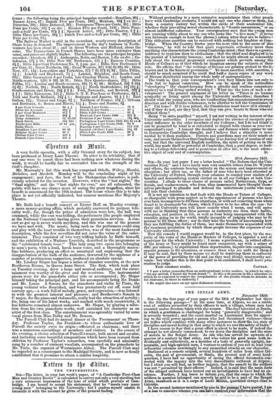Mr. Balfe had a benefit concert at Exeter Hall on
Monday evening : a mere money-getting affair, which probably answered its purpose tole- rably well; for, though the prices of admission were low, the hall was crammed, while the cost was trifling, the performers (the people employed at the National Concerts) having given their gratuitous services. A con- cert so got up is never worth anything, and this was one of the poorest we have met with. The music, being such as the performers could sing and play with the least trouble to themselves, was of the most hackneyed description, while the few novelties did not raise the value of the enter-- tainment They consisted of two very trifling ballads by Balfe himself, and the exhibition of a Madame Luccaola, described in the programme as the "celebrated female tenor." This lady sang two opera airs belonging to men's parts, with a loud, harsh tenor voice, and a thoroughly mascu- line boldness, producing an effect so unnatural and unpleasing that the disapprobation of the bulk of the audience, thwarted by the applause of a number of pertinacious supporters, produced on absolute uproar.
Mr. Lindsay Sloper has begun a series of chamber concerts, at the new Beethoven Rooms, in Queen Anne Street. The first, which took place on Tuesday evening, drew a large and musical audience, and the enter- tainment was worthy of the giver and the receivers. The instrumental pieces were for the pianoforte either solo or accompanied ; Mr. Sloper himself taking the principal part, and his accompanists being Mr. Dando and Mr. Lucas. A Sonata for the pianoforte and violin by Pinto, the young violinist who flourished, and was prematurely cut off, some half century ago,—a work full of melody, grace, and expression,—was listened to with the greatest interest and pleasure ; and Beethoven's Sonata in C major, for the piano and violoncello, really had the attraction of novelty; for being one of his latest works, and marked with much eccentricity, it has hitherto remained almost unknown. Mr. Sloper, by playing a selec- tion from his own pianoforte works well sustained his character as an artist of the first class. The entertainment was agreeably varied by some vocal pieces from Miss Dolby and Mr. Benson. The Purcell Club had its annual dinner at the Freemasons' on Thurs- day. Professor Taylor, the President—to whose enthusiastic love of Purcell the society owes its origin—officiated as chairman • and there was a numerous assemblage of members and visiters. In the course of the evening, a choice selection of Purcell's music, both sacred and secular, and including some beautiful compositions which have been rescued from oblivion by Professor Taylor's researches, was carefully and admirably sung by a number of eminent vocalists, accompanied on the pianoforte by Mr. Turle the organist of Westminster Abbey. The Purcell Club may be regarded as a counterpart to the Madrigal Society, and is now so firmly ' established that it promises to attain a similar longevity.


























 Previous page
Previous page